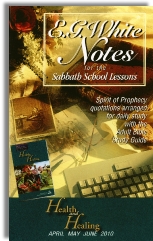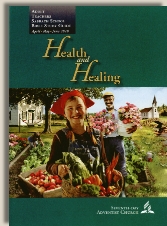|
||||||||||||||
Commentary on "Praise God From Whom All Blessings Flow"
Day 6: Thursday, April 1, 2010
Overview
This day’s lesson address Romans 12:1, “I beseech you therefore, brethren, by the mercies of God, that ye present your bodies a living sacrifice, holy, acceptable unto God, which is your reasonable service.” The opening remarks recaps the point that God wants to have a relationship with us and says, “At the enter of that relationship stand the Cross and the plan of salvation, because—of all the reasons we have to love God—the Cross remains by far the best one.”
The lesson moves the realization of this text into healthful habits and being able to praise God with our physical bodies. It makes the point that substances and diseases destroy health and brain cells, and then it says, “Clearly we are dependent on our physical state to enjoy clear mental, emotional, and spiritual relationships.
The next point made is that foods and drink consumed regularly can become problems for our mental and physical health, and it ends with the questions, “How might lifestyle choices be a means of praising God? At the same time, how might wrong lifestyle choices be a way of denying God?”
Obsrvations
First, the lesson’s premise is that we can choose to honor and praise God for many reasons. The cross is one of those reasons—the best reason.
The cross is not one thing among many for which we ought to thank God. It is THE reason we are even able to give thanks. Because of the cross, we have life—if we have repented and received the Lord Jesus. The cross is not the best reason to praise God—it is the reason that makes it possible for us to praise Him for the rest of His goodness.
Moreover, praising God with our bodies is never identified as a healthy lifestyle in the Bible. Using Romans 12:1 as a text to support eating and drinking “right” is a misuse of the text. That passage is about presenting one’s who self as a soldier reporting for duty. It has nothing at all to do with eating or drinking.
If physical health or even mental health were requisite for being able to praise God, there would be no hope for the developmentally disabled or for people with chronic diseases such as type 1 diabetes or spinal cord accidents.
John 4:23-26 record the exchange between Jesus and the Samaritan woman at the well. He told her that the day was now here when true worshipers would worship God in spirit and in truth, because God is spirit. This text alone articulates the reality that we have literal spirits than can know and worship God. It is not our minds per se where we know God; it is in our spirits—and with our spirits, we worship Him.
The fact that humans have spirits is one of the significant ways we are created in God’s image—He is a spirit, and we are spiritual beings.
Because our spirits are what are made alive when we are born again, people without full bodily or even cognitive function can know and worship God—and their ability to know God deeply is not limited. The chronically physically ill often know the Lord Jesus with depth and intimacy physically healthy people do not have. Amy Carmichael, for example, who spent most of her adult life in India rescuing orphaned girls from temple prostitution, was bed-ridden during most of her last 20 years of life. The books that she wrote reveal an amazing trust and closeness to God.
The developmentally disabled class at our church, Trinity Evangelical Free Church in Redlands, California, has shown me that people can be significantly mentally compromised but still know and trust and love the Lord Jesus. Their cognition is not needed for a deep trust to exist.
The Adventist attitude with which I grew up—that the developmentally disabled would likely become as if they had never existed when Jesus came back—could not be more false. They will be restored to full function—and they will be eternally with the Jesus they came to know and love as they struggled through their mortal lives with compromised bodies and minds.
When we realize that we have spirits—as described further in 2 Corinthians 5:1-10 and Romans 8, it becomes clear that the traditional Adventist emphasis on lifestyle and physical health is misplaced. A healthy body is good—but it does not promote love for God.
A living relationship with the Lord Jesus may well result in better physical health because one is finally able to make decisions that are truthful instead of self-deceiving, but the health of the body does not contribute to a loving relationship with Jesus.
Summary
- Romans 12:1 is about reporting to God for duty, not about eating and drinking healthfully.
- The cross is not merely the best reason to praise god; it is the only way we can become able to praise God truly.
- Physical health does not contribute to spiritual health. The inverse may be true—that being alive spiritually may contribute to physical health.
- Knowing God is not enhanced by physical health. Our spirits are either alive in Jesus or dead in our sin (Eph 2:1-10). If our spirits are alive, we know God and are indwelt by Him.
- The developmentally disabled and the chronically ill or injured are not less able to know and love God than are the physically healthy.
- We know and worship God with our spirits—for God is spirit (John 4:25).
- Our health may be a good thing, but our knowing God does not depend upon it.
Copyright 2010 BibleStudiesForAdventists.com. All rights reserved. Revised March 29, 2010. This website is published by Life Assurance Ministries, Glendale, Arizona, USA, the publisher of Proclamation! Magazine. Contact email: BibleStudiesForAdventists@gmail.com.
The Sabbath School Bible Study Guide and the corresponding E.G. White Notes are published by Pacific Press Publishing Association, which is owned and operated by the Seventh-day Adventist church. The current quarter's editions are pictured above.
Official Adventist Resources
Standard Edition Study Guide Week 1
Teacher's Edition Study Guide Week 1
Easy Reading Edition Study Guide Week 1
Search the Complete Published Ellen G. White Writings


